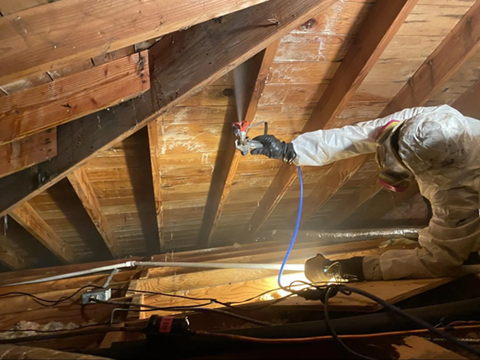
Finding mold in your attic is never a good sign and usually points to bigger problems like roof leaks, insulation issues, or poor ventilation that need fixing before they get any worse. Unlike other parts of your home, the attic often goes unnoticed, and since we don’t use this space as much, mold growth can go undetected for weeks or even months.
Some mold types are harmless in small amounts, while others can spread and cause serious health risks if you don’t get an attic mold removal company to remove them. That being said let us walk you through the most common types of mold found in the attic.
Alternaria
Alternaria includes many species, but only a few grow indoors and spread their spores through the air or HVAC system. You will find this mold type in poorly ventilated or damp areas, where it can spread fast without getting detected early. If Alternaria is present in your attic, clean your ducts and remove the mold so it cannot recirculate spores throughout your house.
Chaetomium
This mold loves wet wood, drywall, and paper and has a cotton-like texture. They often appear after water damage or a roof leak, but their presence is a big red flag as it indicates an ongoing moisture problem that needs to be fixed; otherwise, it will keep coming back. Long-term exposure to this mould can cause a musty odour and weaken wooden structures in your home.
Epicoccum
Epicoccum spreads through the air and often grows on wood, fabrics, and all materials you commonly store in attics. You can identify Epicoccum mold by its distinctive orange or yellow colour, and its presence in your attic means there’s excess condensation or humidity present. Although it spreads less aggressively than others, it still requires you to control moisture within your attic; otherwise, you cannot get rid of it.
Attic mold can be of various types, and each of them has some characteristics that separate them from the others. Once you spot mold in your attic, take steps to remove it; otherwise, it will spread throughout your home without you even realising.
